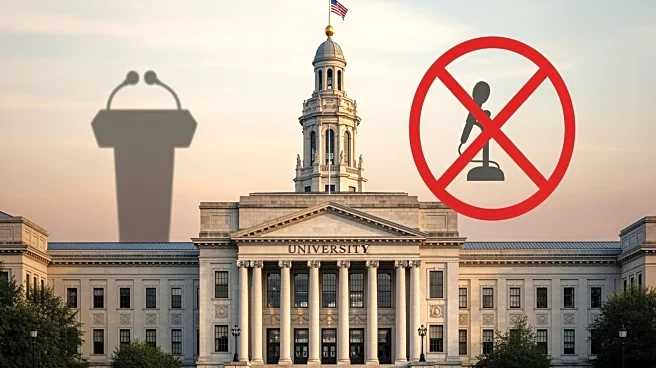What's Happening?
Brown University has declined a proposal from the Trump administration that offered favorable access to federal funding in exchange for various commitments. The university's president, Christina Paxson,
expressed concerns that the proposal would restrict academic freedom and compromise the institution's independence. This decision follows a similar rejection by the Massachusetts Institute of Technology, which cited restrictions on free speech and campus autonomy. The proposal, part of a broader initiative by the Trump administration, aimed to bring substantial federal grants to participating universities. Brown's refusal is aligned with the views of its stakeholders, who prioritize maintaining the university's governance and mission.
Why It's Important?
The rejection of the Trump administration's proposal by Brown University highlights ongoing tensions between higher education institutions and government policies that may infringe on academic freedom. This decision underscores the importance universities place on maintaining autonomy over their curriculum and academic speech. The proposal's focus on promoting conservative viewpoints and altering admissions policies could have significant implications for diversity and inclusion efforts within these institutions. The broader impact of such proposals may affect the relationship between universities and the federal government, potentially influencing future funding and policy decisions.
What's Next?
The Trump administration has invited feedback from universities by October 20 and requested decisions by November 21. As Brown University and MIT have rejected the proposal, other institutions may follow suit or negotiate terms that better align with their values. The administration's initiative to reform higher education through this compact may face challenges if more universities prioritize academic freedom over federal funding. The outcome of these negotiations could shape the future of higher education policy and the role of government in academic affairs.
Beyond the Headlines
The proposal's emphasis on conservative viewpoints and the elimination of diversity targets in admissions raises ethical and cultural questions about the direction of higher education in the U.S. The potential shift towards a more conservative academic environment could impact the inclusivity and representation of diverse perspectives within universities. This development may also influence public discourse on the role of government in shaping educational priorities and the balance between funding and institutional independence.










